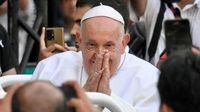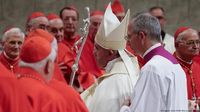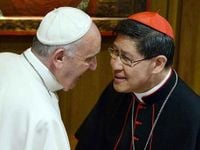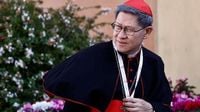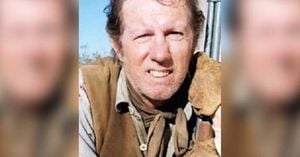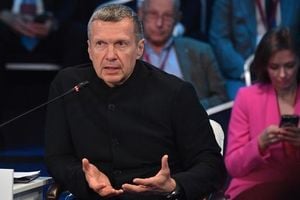Pope Francis, the supreme leader of the Catholic Church, passed away on Monday, April 21, 2025, at the age of 88 in his residence at Casa Santa Marta, Vatican City. Following his passing, the process of selecting a new pope will begin, a procedure steeped in tradition and significance.
The papal conclave, which is the assembly of cardinals responsible for electing the new pope, can take several days, weeks, or even longer, depending on the outcome of the voting. According to Al Jazeera, the conclave can conduct up to four voting rounds each day to reach the required two-thirds majority. If no candidate is elected after 33 rounds, the two frontrunners will proceed to a final runoff vote.
One of the prominent figures expected to succeed Pope Francis is Cardinal Luis Antonio Tagle of the Philippines. At 67 years old, Tagle is widely regarded as a strong contender who could carry forward Pope Francis’ progressive vision for the Church. He is often referred to as “The Asian Francis” due to his focus on social justice and inclusion. Tagle has significant experience leading the Congregation for the Evangelization of Peoples and is a trusted figure within Francis' inner circle.
“Overall, I think the fact that by my count over 100 of the eligible papal electors were appointed by Francis could have a profound effect on the outcome,” said Cristina Traina, a professor at Northwestern University. “That is, we may not get a pendulum swing away from Francis' priorities.”
Born on June 21, 1957, in Manila, Tagle was ordained as a priest in 1982. He quickly gained recognition for his ability to combine intellectual precision with a deep connection to society, particularly the marginalized. His academic pursuits led him to earn a doctoral degree in theology from the prestigious Pontifical Gregorian University in Rome.
Tagle's ecclesiastical career began with his appointment as Bishop of Imus in 2001, and he became Archbishop of Manila in 2011, significantly elevating his influence. Known for his strong commitment to social justice, human dignity, and poverty alleviation, he has earned widespread admiration both in the Philippines and internationally. His leadership within the Church took a major step forward in 2012 when Pope Benedict XVI appointed him to the College of Cardinals, marking the start of his deeper involvement in Vatican affairs.
If chosen, Tagle would make history as the first pope from Asia in the modern era. His selection would reflect the growing presence of the Church in the southern hemisphere, particularly in regions such as Asia and Africa, where the Catholic population is rapidly expanding.
However, Tagle’s nomination is not without challenges. Conservative groups within the Church may view his progressive stance on issues such as climate change, poverty alleviation, and the rights of marginalized groups as too closely linked to Pope Francis' agenda. His past leadership role at Caritas Internationalis has come under scrutiny due to accusations of institutional bullying, which may affect his candidacy.
As the global Catholic Church mourns the death of the Argentine pope, attention now turns to the centuries-old conclave that will elect his successor. Cardinal Tagle is not the only frontrunner; the intercontinental array of possible successors includes figures from Asia, Africa, North America, and Europe. Only cardinals under the age of 80 are eligible to vote, and typically about 120 of them participate.
Among the other strong contenders is Cardinal Pietro Parolin, 70, Italy’s Secretary of State. Parolin is widely seen as a candidate of consensus, known for his diplomatic acumen and moderate theology. He has played a key role in Vatican-China relations and is credited with maintaining internal cohesion during Francis’ most controversial reforms.
Another notable candidate is Cardinal Matteo Zuppi, 69, the archbishop of Bologna, who is aligned with Francis’ inclusive vision. Zuppi is known for his pastoral work and has been involved in peace negotiations, but his close ties to Francis could alienate cardinals hoping for a shift in papal tone.
Cardinal Peter Erdö, 72, of Hungary, represents a more traditionalist viewpoint. His authority within Europe is well-established, and he has long defended the Church’s teachings on marriage and sexuality. Erdö’s conservative stance could appeal to those wary of rapid reforms.
Additionally, African cardinals such as Fridolin Ambongo Besungu from the Democratic Republic of Congo and Peter Ebere Okpaleke from Nigeria are also being considered. Ambongo, 65, is a Capuchin friar and a key voice for social justice in Africa, while Okpaleke, 62, has a compelling pastoral story, having been appointed by Benedict XVI but blocked from serving until Pope Francis intervened.
As millions of Catholics and observers around the world turn their attention to Rome, the question of who will succeed Francis has become one of the most searched topics across digital platforms. The death of Pope Francis marks the end of a transformative papacy that brought bold reforms and global conversations on migration, inclusion, and climate change.
The conclave will begin between 15 and 20 days after the pope’s death. The 138 eligible cardinal-electors will gather in the Sistine Chapel under strict isolation to vote in secrecy until a candidate secures at least two-thirds of the votes. Each voting round consists of cardinals writing the name of their chosen candidate on a ballot. The votes are counted and verified, and the ballots are burned. If no pope is elected after a round, the smoke released is black; when a new pope is chosen, white smoke signals the decision to the world.
The choice of the next pope is more than symbolic—it will define the spiritual and political path of the Church for years, if not decades. The cardinals face a historic decision: embrace continuity with the Francis era or mark a shift toward tradition and internal order. Regardless of who is elected, the new pontiff will inherit a complex global Church grappling with internal reforms, moral debates, and a changing world.
